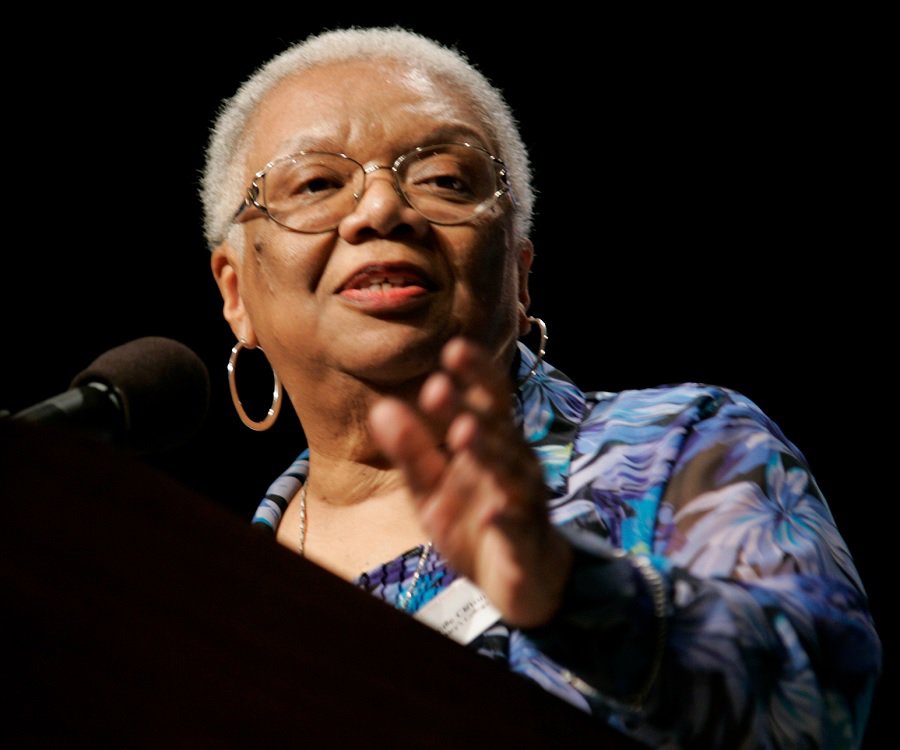Monday
We recently had a special event honoring the memory of Lucille Clifton, who ended her teaching career at St. Mary’s. Her three daughters were there, as was her friend Toi Derricotte, who presented the first annual St. Mary’s College Lucille Clifton Legacy Award to poet Yona Harvey.
Derricotte also read a poem about establishing a telephone friendship with a woman by reading her Clifton poems. It reminds us that poetry can have many different impacts:
Homage to Lucille Clifton
By Toi Derricotte
When I call to change my reservations
so that I can go to Baltimore to honor Lucille,
the woman at US Air
doesn’t laugh easy.
I’m trying to communicate—
not only that I have to change
my reservation—but
that I have to change it quick and
for the most important reason!
(Maybe if US Air knows
it’s for Lucille, they’ll say,
Oh shucks, then just go free!).
I ask: Ever hear of Lucille Clifton?
No. (I am always flabbergasted
by what people don’t know about the best
poets—I mean—in the universe!)
I go on and change the reservation,
getting charged the hundred bucks,
and, as she’s giving
dates, times, and numbers, we get
acquainted and a little warmer,
so, at the end I say, Want to hear
a poem by her? and she says—
an upsweep in her voice—Sure!
I run down with the phone like there’s
a new guest in my house—a real
woman coming to life close
to my mouth and ear—and I find it
alphabetical on the shelf, Good Woman
jumps into my hand, and I open to the first poem
and begin:
in the inner city
or
like we call
it home to this
woman who sounds
tired of making
reservations and the people
who think theirs is most
important.
I say—Want to hear another, and she says
Yes, even happier, that was really
good, and I open to:
i was born with twelve fingers
like my mother and my daughter.
each of us
born wearing strange black gloves which ends
and we connect
my dead mother my live daughter and me
through our terrible shadowy hands
That is wonderful, she says, and now she sounds as close
to me as love, and I say, Lucille doesn’t have an easy
life, she has breast cancer, she has to have
dialysis, a kidney transplant, and she lost her daughter
and her son.
If you saw her you’d know
how great, but you’d also see
how real. You’d see she has some special
hook up to the center and all that
energy comes from there.
And the operator says,
I am really moved, and I will, I really will look her
up. My name is Treesy and last week I found out that my
nine year old daughter has cancer, and I want to
get that book and read those poems
to her, she will really
like them. And I said isn’t that
wonderful that we talked and that I got
to read you Lucille? After I lost my mother, she told me
When you lose the flesh
you gain more power. And I said it’s like that, like
the miracle of meeting you, you
meeting Lucille, and
just this—!
What about those two Clifton poems opened up the conversation with the mother of a sick child?. In the first, Clifton provides a voice for the marginalized. Their lives may be more challenging than those of more affluent people but they are also more vibrant:
in the inner city
or
like we call it
home
we think a lot about uptown
and the silent nights
and the houses straight as dead men
and the pastel lights
and we hang on to our no place
happy to be alive
and in the inner city
or
like we call it
home
In the second poem, Clifton refers to a belief in some African tribes about the significance of a sixth finger. When we force people to conform to a socially acceptable image, we miss their special gifts.
I was born with twelve fingers
like my mother and my daughter
each of us
born wearing strange black gloves
extra baby fingers hanging over the sides of our cribs and
dipping into the milk
somebody was afraid we would learn to cast spells
and our wonders were cut off
but they didn’t understand
the powerful memory of ghosts now
we take what we want
with invisible fingers
and we connect
my dead mother my live daughter and me
through our terrible shadowy hands
While we don’t know whether Derricotte’s interlocutor Treesy is a woman of color, she feels alone in the world because of her daughter’s illness. The idea that a poet out there understands her—and that an anonymous customer cares enough to read work from this poet to her—suddenly makes the world seem less impersonal. Or like we call it, home.
In the second poem, meanwhile, a medical condition that seems bad—having six fingers—suddenly becomes a source of strength. The condition also connects mother and daughter. This may prompt Treesy to talk about her own sick daughter, which in turn leads Derricotte to describe the way that Clifton struggled with tragedy and to recount her own mother’s empowering words.
Worry and fear have probably narrowed Treesy’s horizon. Clifton’s poetry makes her realize that the world is larger and full of possibilities.


